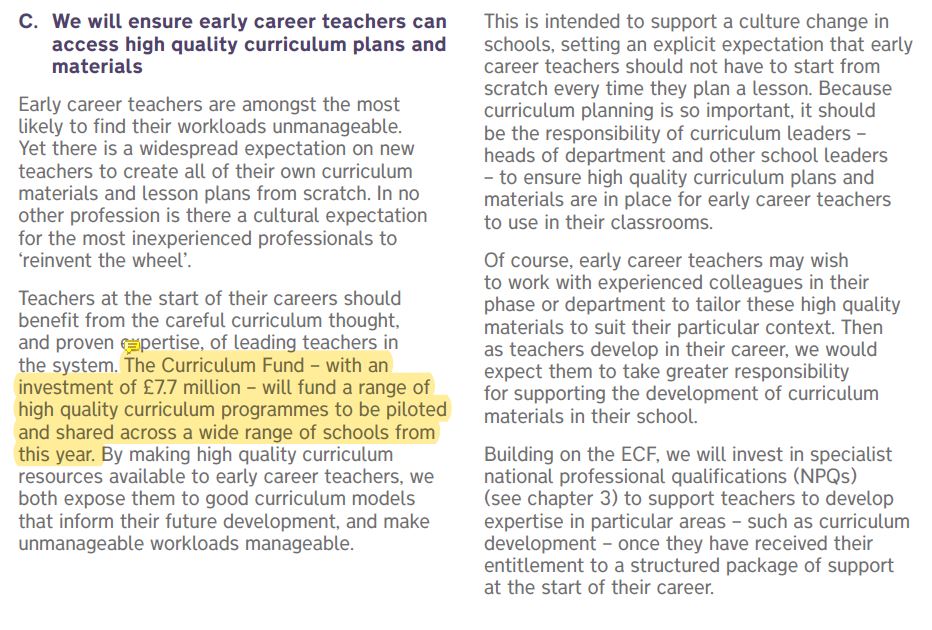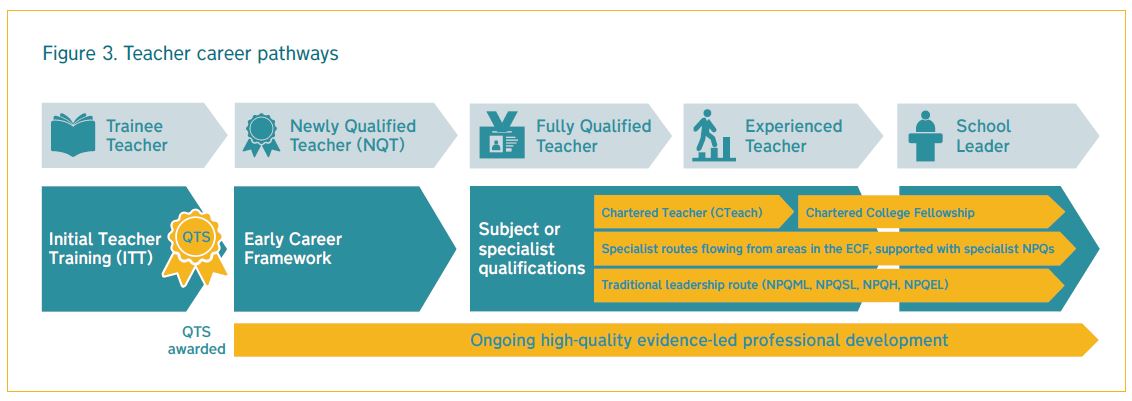Last January I published some key steps I thought the DfE might take to improve teacher recruitment and retention. Today I want to go back to these suggestions and consider them in light of the DfE's new strategy. First a quick reminder:
- Reduce confusion around training routes
- Ensure strong subject (or phase) specific training is in place
- Fund and support ITE and NQT mentors
- Reduce workload
- Improve pay and pensions
- Rethink bursaries
- Improve professional freedoms
- Leave supply models alone
A marked improvement?
Let’s start with the positives. It is certainly evident that the DfE has gone well beyond the measures we have seen in the last few years when considering their recommendations. There are welcome
The issues of professional freedoms and the standing of the profession is a somewhat greyer area. The new strategy certainly notes micro-management of teachers and excessive data collection as problems which need to be addressed, though there is little sense of how this will be achieved. The new focus of the draft Ofsted framework on curriculum and effective teaching may help provide more professional freedoms for teachers, but this is counterbalanced against an increasing culture in MATs to centrally control curriculum provision in a way hitherto unseen in English schools. What professional freedoms remain for teachers who are tasked with enacting pre-prepared lessons remains to be seen.
EDIT (29/1/19) We now know eleven of the schools selected to provide these resource. Of these, nine are Southern, eight in the South East or London, and all are Academies. It is also notable that places such as Oasis were involved in entering large numbers of pupils for the ECDL. It is also notable that the development of history resources is being undertaken by WLFS where the current curriculum is based almost exclusively on a single, moderately controversial, textbook.
I also have great reservations around the development of the Early Career Framework. Whilst I am delighted that the DfE are taking the development of new teachers seriously, and am thrilled that this will get formal recognition in schools, I do have real concerns about how this will work in practice. I certainly agree that a framework of career development should run through from the ITE year and support teachers in their early careers. I also think it is fantastic that the DfE are promising money to support NQT and RQT mentors and to make such training accessible. However, there are a range of issues which are still left open:
- The Early Career Framework promises a real sea change for NQTs, however it is still unclear how this framework will be developed and how it will draw (or not) on the work of subject associations and communities. To take history as an example, there is already an incredibly vibrant community, in the Schools History Project and Historical Association, dedicated to supporting new and experienced teachers alike. Every year around 50% of attendees to the SHP summer conference are NQTs or RQTs for example. It would be a crying shame if such expertise was overridden by a generic framework of early career training which ignored the rich traditions of curricular and pedagogical discussion which already exist.
- EDIT (29/1/19): I have now seen a full copy of the framework and issues of genericism abound. Please see this Twitter thread for more.
- I love the idea of having NPQs which focus on classroom expertise, but again there is no sense of how these might be made subject specific. Focus areas such as ‘assessment’ and ‘pedagogy’ are mentioned as if these can be separated from one of the other areas ‘subject and curriculum expertise’.
- Second year teachers are promised 5% extra free time. This amounts to one period a week in a standard school. Hardly ground-breaking. Before the cuts to school budgets, many schools under-utilised early phase teachers by one or two periods a week to support them anyway.
- Mentors are promised funded time and training but no figures are given for these. Nor is it clear whether or not mentors will be trained to be subject specific mentors, or just undergo a generic mentoring course. I fear a lot of money might be made here by consultants seeing an opportunity for a quick buck! Equally, ITE mentors are promised nothing and this is still a huge issue in schools.
- There is a continued and worrying focus on the role of MATs in the development of new materials. Although there are many fantastic MATs out there, there seems to be a deliberate non-engagement with the expertise which might be found in university education departments, and of course subject associations.
Finally, I want to touch briefly on some of the other parts of the strategy.
- The idea of a streamlined application process is welcome. However, it does little to help applicants ascertain the differences between a SCITT course offering no subject specific input, and a high quality university led course (such as those history courses run at Cambridge, Leeds Trinity, Nottingham, Oxford, UEA etc.) offering 20 or more days focusing on specific disciplinary issues of curriculum and pedagogy. All this despite the fact that subject expertise is routinely cited as the core of great teaching.
- There is still an ideological bias towards school centred teacher training. MATs are noted as the vehicle by which fragmentation in the system (which exploded after the development of school centred training routes) might be reduced. Universities get no mention, despite having historical expertise, economies of scale, and links to the research which the DfE and Ofsted now purport to value. MATs and school alliances are noted as running “the most prestigious ITT programmes.” However, good universities (and their partners) are responsible for developing Initial Teacher Education programmes rather than training courses. Whilst ITT enables trainees to deliver content and furnishes them with generic knowlegde, ITE programmes ensure trainees engage critically with their subject, curriculum and subject pedagogy in ways which help develop flexible professionals who are much better placed to meet the demands of the modern education system.
- There seems to be a disproportionate role given to Teach First in developing teacher training routes for career changers and mature trainees. Recent studies showed that Teach First was one of the least cost efficient ways of training new teachers, especially when coupled with the extremely high drop out rate of 60% in five years. Why Teach First is therefore seen as the go-to provider, when many universities and school directs already take high proportions of trainees over the age of 25, is a mystery (this is especially true at Leeds Trinity and Leeds Trinity Partnership SD courses).
- Part time working is a nice idea, but I am just not sure it is the great leap forward the DfE are claiming.
So, what’s the verdict? In short, I think the DfE have probably realised the scale of the problem and I commend them for taking positive action to clear up some of the mess which the last eight years have left us with. However, I worry that the ideological blinkers may well mean that a good deal of excellent subject specific provision and other possible avenues of improvement are ignored or swept aside to allow the MAT model to dominate. I am happy of course to be proven wrong, but I won’t be cancelling any appointments to sit by my phone.



 RSS Feed
RSS Feed
